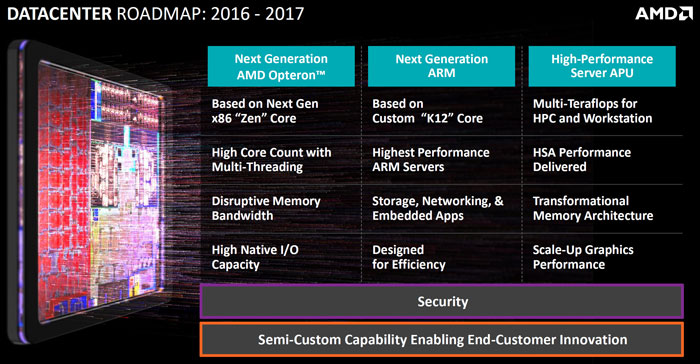You could reasonably argue that AMD is back on the up. There's plenty of interest in the upcoming RX 480 GPU launching at the end of the month. Somewhat further out is the brand-new CPU architecture known as Zen hewn from a leading-edge 14nm process. A number of slides from an extant presentation at Cern shows that Zen will come in swinging armed with up to 32 cores and 64 threads through symmetrical multi threading. Feeding the best, we know so far, is space for octo-channel DDR4 memory and heaps of IO as well as 10Gbe Ethernet.
Just how much juicy meat is on the Zen bones is provided by some details obtained by the folks over at Fudzilla. With a good track record of rumour turning into fact, Fudzilla opines that the top-level Zen processor, designed for the server environment, is indeed beastly in specification and will come to market early next year.
Feast over these numbers for the 'Naples' variant: 32 cores and 64 threads, 64MB of L3 cache, and a whopping 128 PCIe Gen 3.0 lanes. TDPs range between 35-180W, according to the report. We believe that AMD is achieving this core density by using some form of multi-chip module (MCM), connecting two 16-core processors together with an interconnect that runs via that surfeit of PCIe laneage.
Should this rumour turn out to be fact, we can expect AMD to come with some serious silicon artillery aimed squarely at the server market, currently serviced by a long line of Xeons, that makes Intel a heap of money. This new Opteron is pregnant with performance potential.

More pertinently for the consumer, a 16-core version of Zen, if clocked at reasonable levels and achieving that 40 per cent improvement in IPC compared to the much-maligned current generation, could certainly challenge, and even surpass, the performance hegemony enjoyed by the LGA2011-based Core i7 chips headlined by the exorbitantly priced Core i7-6950X.
It's very easy to be carried away with what AMD might or might not achieve with Zen, both in server and consumer spaces, so we merely hope that it is genuinely competitive against the best that Intel has to offer: honest-to-goodness choice in the premium end of the x86 CPU market would be a great thing.













